新概念英语第二册Lesson2
新概念英语第二册Lesson 2 _Breakfast_or_lunch
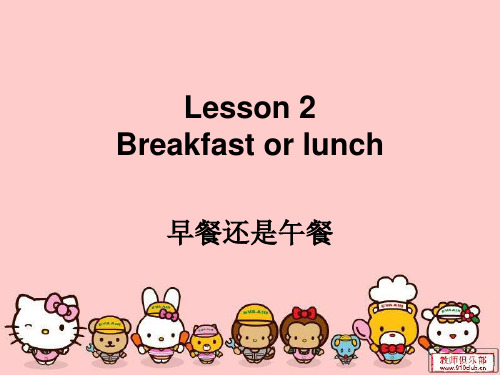
(1)What a day! What引导感叹句: 引导感叹句: 引导感叹句 1. what + a/an + adj. + n.(单数 + (主谓 单数) 主谓 主谓) 单数 eg: what a beautiful picture (it is)! ! 2. what + adj. + n.(复数 + (主谓 复数) 主谓 主谓) 复数 eg: what beautiful girls! (2) How interesting it is! How 引导的感叹句: 引导的感叹句: How + adj./adv. + (主谓 主谓) 主谓 How beautiful the picture is. P 18 exercise
aunt & uncle grandmother & grandfather mother-in-law & father-in-law grandson & granddaughter cousin 堂(表)兄弟姐妹 nephew侄子,外甥 & niece 侄女,外甥女
频率副词
• I never get up early on Sundays. “never” 频度副词 频度副词(0%) • 100% all the time 一直 • 90% almost, always 几乎,总是 几乎, • 60-70% often, frequently ['frikwəntlɪ]经常 ɪ • 20-30% sometimes, at times 有时 , • 5% rarely [‘rɛrlɪ] , hardly, seldom 很少,几乎不 [‘rɛrlɪ 很少, • 位于 、助动词后面,实意v.之前 位于be、助动词后面,实意 之前 • P18 exercise
(完整版)新概念英语第二册课文原文 (2)
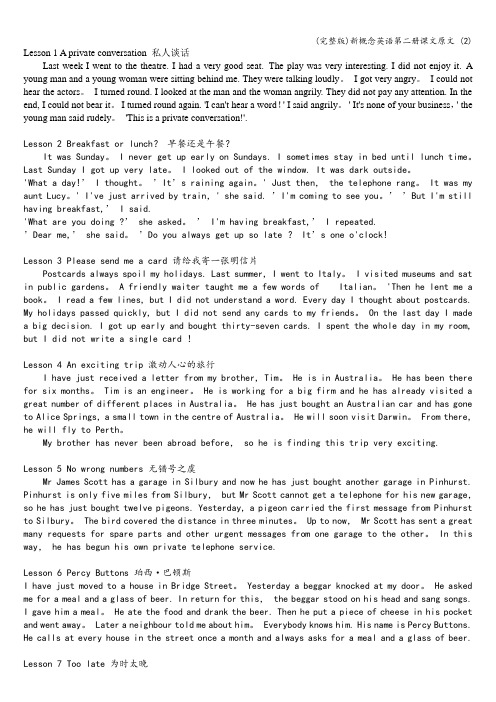
Lesson 1 A private conversation 私人谈话Last week I went to the theatre. I had a very good seat. The play was very interesting. I did not enjoy it. A young man and a young woman were sitting behind me. They were talking loudly。
I got very angry。
I could not hear the actors。
I turned round. I looked at the man and the woman angrily. They did not pay any attention. In the end, I could not bear it。
I turned round again. 'I can't hear a word!' I said angrily。
' It's none of your business,' the young man said rudely。
'This is a private conversation!'.Lesson 2 Breakfast or lunch?早餐还是午餐?It was Sunday。
I never get up early on Sundays. I sometimes stay in bed until lunch time。
Last Sunday I got up very late。
I looked out of the window. It was dark outside。
'What a day!’ I thought。
’It’s raining again。
新概念英语2第二课 NCE2_Lesson02

★ aunt n. 姑,姨,婶,舅妈
• 所有长一辈的女性都用这个称呼 • 男性则是uncle: 叔叔 • 他们的孩子:cousin 堂兄妹(不分男女) • cousin的孩子:nephew 外甥,侄子
niece 外甥女,侄女
★repeat v. 重复(=Pardon)
① vt. 重复 • 你能重复最后一个词吗? • Will you repeat the last word? • 跟著我念这些句子 • Repeat these sentences after me. ② vi. 重做,重说 • 她只是反覆地做同样的事 • She did nothing but repeated.
1、在肯定句中,它与表示持续性状态的动词连用,表示某动作持续到 某一时刻:
我会在这里等到5点钟。 I’ll wait here until 5. 直到他回来为止,他爸爸都是活着的. His father was alive until he came back. 2、在否定句中,它通常与描述短暂动作的动词连用,“直到……才”: 她到6点才能来。 She cannot arrive until 6. 直到他回来,他爸爸才死. His father didn't die until he came back.
★ring(rang. rung)
① vt. 鸣,(铃、电话等)响(往往是提醒人做某事) • 每天早上表都在六点钟响。 • Every morning the clock rings at 6. • 电话/门铃响了。 • The telephone(door bell) is ringing. ② vt. 打电话给(美语中用call) • 明天我会给你打电话 • Tomorrow I'll ring you. ③ n. (打)电话 give sb. a ring • 记得明天给我打电话 • Remember to give me a ring. /Remember to ring me. ④ n. 戒指 • 他给了她一个钻石戒指作为生日礼物 • He gives her a diamond ring as a birthday present.
新概念英语教案-第二册第二课-完美版

Lesson 2 - Breakfast or lunch?TextIt was Sunday.I never get up early on Sundays.I sometimes stay in bed until st Sunday,I got up very late.I looked out of the window.It was dark outside."What a day!"I thought.It's raining again.Just then,the telephone rang.It was my aunt Lucy."I've just arrived by train."she said."I'm coming to see you.""But I'm still having breakfast."I said."What are you doing?"She asked."I'm having breakfast."I repeated."Dear me!"She said."Do you always get up so late?It's one o'clock."New words and expressions 生词和短语until prep. 直到outside adv. 外面ring v. 〔铃、等〕响aunt n. 姑,姨,婶,舅母repeat v. 重复Note on the text 课文注释1 on Sundays, 指每个星期日。
星期几的前面用介词on。
2 What a day! 多么糟糕的天气!这是一个省略的感慨句。
完整的句子应该是Whata day it is!英语中的感慨句常用what开头,后面紧跟一个名词或名词性短语〔包括连系动词〕,然后是主语和谓语,句尾用感慨号。
新概念英语第2册课文(完整版)
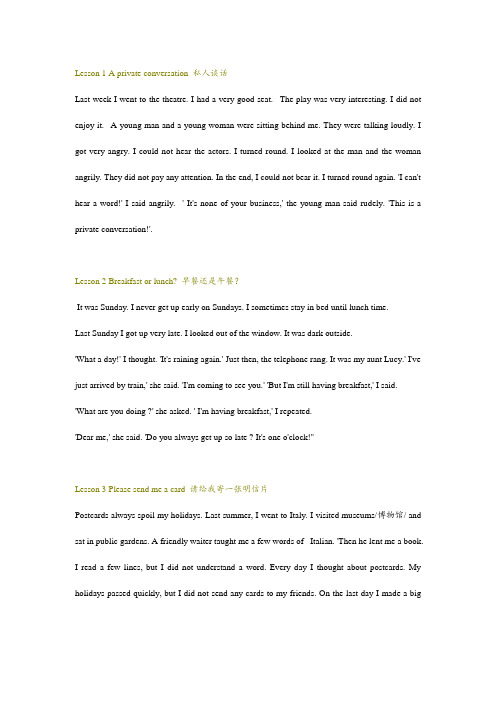
Lesson 1 A private conversation 私人谈话Last week I went to the theatre. I had a very good seat. The play was very interesting. I did not enjoy it. A young man and a young woman were sitting behind me. They were talking loudly. I got very angry. I could not hear the actors. I turned round. I looked at the man and the woman angrily. They did not pay any attention. In the end, I could not bear it. I turned round again. 'I can't hear a word!' I said angrily. ' It's none of your business,' the young man said rudely. 'This is a private conversation!'.Lesson 2 Breakfast or lunch? 早餐还是午餐?It was Sunday. I never get up early on Sundays. I sometimes stay in bed until lunch time.Last Sunday I got up very late. I looked out of the window. It was dark outside.'What a day!' I thought. 'It's raining again.' Just then, the telephone rang. It was my aunt Lucy.' I've just arrived by train,' she said. 'I'm coming to see you.' 'But I'm still having breakfast,' I said.'What are you doing ?' she asked. ' I'm having breakfast,' I repeated.'Dear me,' she said. 'Do you always get up so late ? It's one o'clock!''Lesson 3 Please send me a card 请给我寄一张明信片Postcards always spoil my holidays. Last summer, I went to Italy. I visited museums/博物馆/ and sat in public gardens. A friendly waiter taught me a few words of Italian. 'Then he lent me a book.I read a few lines, but I did not understand a word. Every day I thought about postcards. My holidays passed quickly, but I did not send any cards to my friends. On the last day I made a bigdecision. I got up early and bought thirty-seven cards. I spent the whole day in my room, but I did not write a single card !明信片总会消耗着我的度假时间。
(完整版)新概念英语第二册第二课(包含课文、练习和答案)
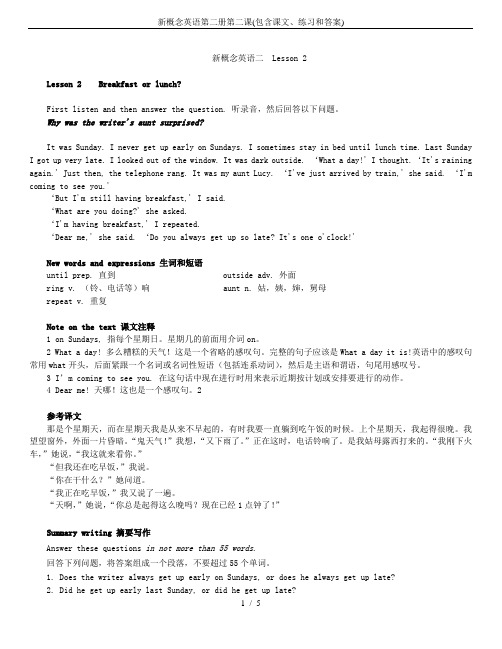
新概念英语二 Lesson 2Lesson 2 Breakfast or lunch?First listen and then answer the question. 听录音,然后回答以下问题。
Why was the writer's aunt surprised?It was Sunday. I never get up early on Sundays. I sometimes stay in bed until lunch time. Last Sunday I got up very late. I looked out of the window. It was dark outside. ‘What a day!' I thought.‘It's raining again.' Just then, the telephone rang. It was my aunt Lucy. ‘I've just arrived by train,' she said. ‘I'm coming to see you.'‘But I'm still having breakfast,' I said.‘What are you doing?' she asked.‘I'm having breakfast,' I repeated.‘Dear me,' she said. ‘Do you always get up so late? It's one o'clock!'New words and expressions 生词和短语until prep. 直到 outside adv. 外面ring v. (铃、电话等)响 aunt n. 姑,姨,婶,舅母repeat v. 重复Note on the text 课文注释1 on Sundays, 指每个星期日。
新概念英语第二册Lesson2说课讲解
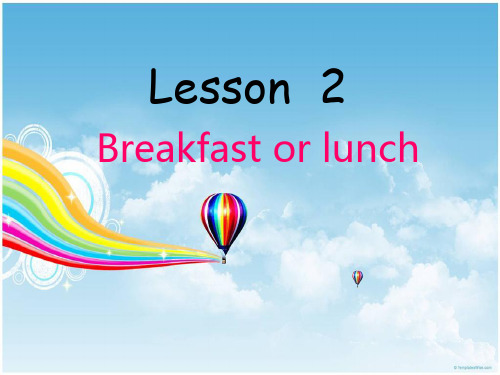
【New words 】
1 until prep. 直到 2 outside adv. 外面 3 ring v. (铃、电话等)响 4 aunt n. 姑,姨,婶,舅母 5 repeat v. 重复
★until prep. 直到
until 用 于表示动
Reading
Predict:
1.What do you think this passage will talk about after reading the title?
2.What is the main idea of the passage?
I always get up late on Sundays. And my aunt was surprised that I was still having breakfast in the afternoon last Sunday.
to wait just outside the door
3. ring (rang, rung)
动词 ①鸣,响(铃,电话等) eg. Every moring the clock ring at 6.
The telephone is ringing. ①打电话给
ring sb. eg. Tomorrow I'll ring you.
直到中午雨才停止。
I did not learn it until yesterday . 到昨天我才知道。
He did not show himself in his true colors until he gained power. 直到他掌权之后,他才露出自己的真 面目。
新概念英语第二册课后练习题答案详解(第2课)
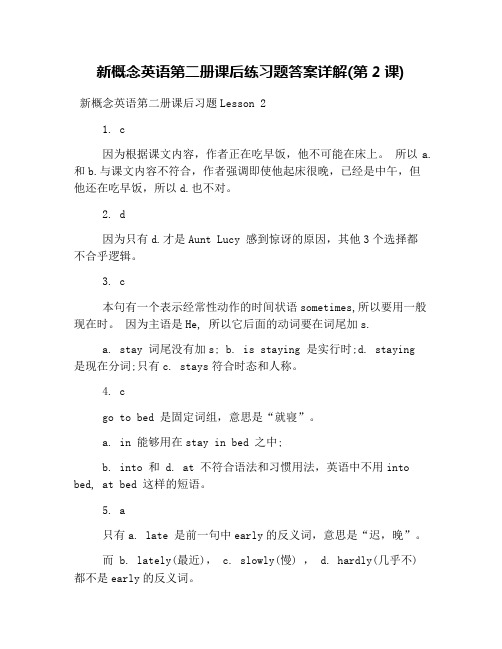
新概念英语第二册课后练习题答案详解(第2课)新概念英语第二册课后习题Lesson 21. c因为根据课文内容,作者正在吃早饭,他不可能在床上。
所以a. 和b.与课文内容不符合,作者强调即使他起床很晚,已经是中午,但他还在吃早饭,所以d.也不对。
2. d因为只有d.才是Aunt Lucy 感到惊讶的原因,其他3个选择都不合乎逻辑。
3. c本句有一个表示经常性动作的时间状语sometimes,所以要用一般现在时。
因为主语是He, 所以它后面的动词要在词尾加s.a. stay 词尾没有加s;b. is staying 是实行时;d. staying是现在分词;只有c. stays符合时态和人称。
4. cgo to bed 是固定词组,意思是“就寝”。
a. in 能够用在stay in bed 之中;b. into 和 d. at 不符合语法和习惯用法,英语中不用into bed, at bed 这样的短语。
5. a只有a. late 是前一句中early的反义词,意思是“迟,晚”。
而 b. lately(最近), c. slowly(慢) , d. hardly(几乎不)都不是early的反义词。
6. b此问句的回答是By train ,是表示方式的,意思是乘火车来的。
只有b. How才能对句子中表示方式的部分实行提问。
而a. When是就时间提问的; c. Why是就原因提问的;d. where 是就地点提问的。
7. b如果填a. still句子不符合语法规则,也不符合逻辑; 选c. often 和 d. always 也不符合逻辑。
只有填b. now 句子才符合逻辑:他现在不能见他姑妈,因为他正在吃早饭。
8. a4个选择都有看的意思。
Look 的词意思是“看,望”强调看的动作,常和介词at, outof 等连用;See 的词意思是“看到,见到”强调结构,后面要带宾语;Watch的词意思是“观看,注视”多用来指看戏剧,电视节目等,是及物动词,如watch TV, watch a play;Remark 的词意思是“注意到,觉察到”也强调结果。
新概念英语第二册 lesson 2

一般现在时的用法
• 表示习惯性动作, 真理! 是过去、现在和未来都会发生的事 情。一般现在时一般与频率副词 often,always, sometimes,never,frequently,rarely,ever 等连用。 • 1)表示经常、反复发生的动作,现存的习惯或状态。 • We are Chinese. • 2)表示客观事实或普遍真理。 • The earth goes round the sun. • 3)表示安排或计划好的未来的动作,只限于go, come, leave, start, stay, return, arrive, begin, be 等动词。 • My train leaves at 6:30 this morning. • 4)表示主语的特征、性格、能力等。 • She is always ready to help others.
一般现在时第三人称单数变化规则
• 1.)一般情况下,直接加 -s • eg. works, plays, rains, sees • 2.)以 sh, ch, s, x 或 o 结尾的词后加 –es • eg. washes, teaches, fixes, does, goes • 3).以辅音字母加 -y 结尾的,先把 ‘y’ 改成‘i’,再加 -es • eg. studies, flies, carries
New Concept English Book2
Lesson 2 Breakfast or Lunch?
【New words and expressions】
until prep.直到
outside adv. 外面(作状语) ring(rang. rung) v.(铃、电话等)响
aunt
新概念英语第二册第2课 完整

from time to time 有时候 • almost never;hardly ever;rarely;
scarcely ever;seldom 很少 • not…ever;never 从不
not until...
She didn't go to bed until eleven o'clock. 她直到十一点才上床睡觉。
They didn't find her until the next day. 他们直到第二天才找到她。
• outside /'aut'saɪd/ n. 外面,外部,外观 备注:inside 里边 outsider 局外人
• aunt /a:nt/ n. 姑母,姨母,阿姨,伯母,舅母,舅妈 uncle 叔叔,伯伯,伯父
• repeat /ri'pi:t/ n. 重复 v.重复
He repeated several times that he was busy. Today's lecture was an exact repeat of yesterday's.
Listen to the story and keep these questions in mind.
• What was the weather like last Sunday? • Who was coming to see the writer? • Why was the writer's aunt surprised?
新概念英语第二册 第2课Breakfast or lunch
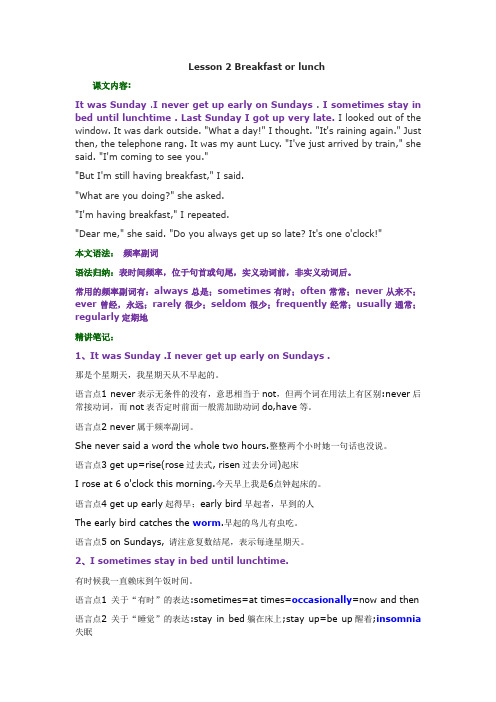
Lesson 2 Breakfast or lunch课文内容:It was Sunday.I never get up early on Sundays. I sometimes stay in bed until lunchtime. Last Sunday I got up very late.I looked out of the window. It was dark outside. "What a day!" I thought. "It's raining again." Just then, the telephone rang. It was my aunt Lucy. "I've just arrived by train," she said. "I'm coming to see you.""But I'm still having breakfast," I said."What are you doing?" she asked."I'm having breakfast," I repeated."Dear me," she said. "Do you always get up so late? It's one o'clock!"本文语法:频率副词语法归纳:表时间频率,位于句首或句尾,实义动词前,非实义动词后。
常用的频率副词有:always总是;sometimes有时;often常常;never从来不;ever曾经,永远;rarely很少;seldom很少;frequently经常;usually通常;regularly定期地精讲笔记:1、It was Sunday .I never get up early on Sundays .那是个星期天,我星期天从不早起的。
新概念英语第二册Lesson2(共62张PPT)

Who? Which? What?
How?
Where?
When?
1. a tree in the corner of the garden he planted 2. we at home stay on Sundays 3. the match at four o'clock ended 4. before lunch the letter in his office quickly he read
一个简单陈述句可以由六部分组成,但是并不是所有 句子都有这么多组成部分,而是包含其中的某几个。 这六部分的排列顺序是基本固定的。
When
Who? Which? What?
Action
Who? Which? What?
How?
Where?
When?
练习题
When? Who? Action Which? What?
直宾
宾语:句子中动 词的接受者;
S + V(vt) + IO + DO 5 基本句型五:主+ 谓+ 宾+ 补
S + V(vt) + DO + OC
During the trip
an angry zookeeper
基本句型五
补充说明宾语,与 之有逻辑关系
We call the man ‘zookeeper’.
Lesson 2 Breakfast or lunch?
Lesson 1 A private conversation
• 上星期我去看戏. 我的座位很好, 戏很有意思, 但我却无法欣赏. 一青年男子与一青年女子坐 在我的身后, 大声地说着话. 我非常生气, 因 为我听不见演员在说什么. 我回过头去怒视着 那一男一女, 他们却毫不理会. 最后, 我忍不 住了, 又一次回过头去, 生气地说 : “我一个 字也听不见了!”
新概念英语第二册2课Lesson2
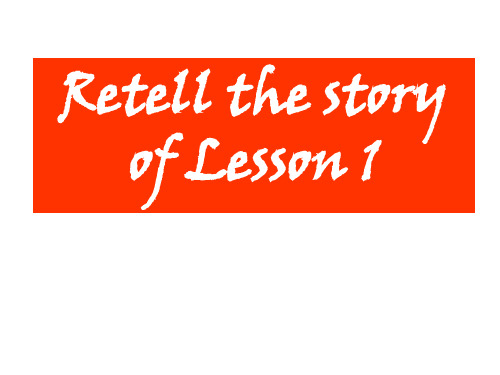
What a day!
• 以what开头的感叹句: • 在英语中可用what引导的感叹句来表示惊奇、
愤怒、赞赏、喜悦等感情,在感叹中主谓语采 用正常语序。 • What 对名词感叹,感叹句的结构为: • What +a/an (+adj.)+n.(+主语+谓语)! • What a good girl (she is)!(主、谓可省)
• My aunt left by the 9:1• by air(plane) • by boat • by car • by sea • by land • by train
• 6、I'm coming to see you. 我将要来看你. • 用 come 的现在进行时态 be coming 表示一
until outside
ring aunt repeat
Lesson 2
•Is he a lazy student?
• Why was the writer’s aunt surprised ?
• It was Sunday .I never get up early on Sundays. I sometimes stay in bed until lunchtime. Last Sunday I got up very late .I looked out of the window. It was dark outside .
I stay in bed until twelve o'clock.
I didn't get up until 12 o'clock.
新概念英语第二册Lesson 2

文化背景
早餐吃什么 V.S. 午餐怎么吃
歪果仁 早餐吃什么
New words and expressions
• until [ʌn'til]
If something happens until a particular time, it happens during the period before that time and stops at that time. 直到...才;直到...为止
it 的用法 1)人称代词 一般代指无生命的东西或有生命的动物,在不分性别或情况不详时指代 This is my watch. It's a Swiss one. The baby smiled when it saw its mother. 2)用作无人称动词的主语时,表示“时间、天气、距离” It's quite early yet. It's getting dark outside. It's not far from here. It's so cold now.
New words and expressions
• aunt [ɑːnt] [ænt]
the sister of your father or mother; the wife of your uncle
姨母; 舅母; 姑母; 伯母; 婶母
uncle ['ʌŋkl]
the brother of your father or mother; the husband of your aunt 叔叔;伯父;伯伯;舅父;姨丈;姑父
Notes on the text
新概念英语第二册Lesson2完整课件

③ n. (打)电话 give sb. a ring 记得打电话给我! Remember to give me a ring.
④ n. 戒指 wedding ring
aunt n. 姑,姨,婶,舅妈 uncle n.叔叔,舅舅,姑父 他们的孩子:cousin[ˈkʌzn] 堂兄妹(不分男女) cousin的孩子:
'Do you always get up so late? It's one o'clock!'
I'm coming to see you. 用 come 的现在进行时态 be coming 表示一般将来,表示 近期按计划或安排要进行的动作。 同样用法的动词有: go,come,leave,arrive… 你马上就要离开吗? Are you leaving at once? 明天他就到了。 He is arriving tomorrow.
repeat v. 重复 不要重复! Don't repeat!
他们正在重复那个有趣的游戏。 They are repeating that interesting game.
Why was the writer's aunt surprised?
It was Sunday. I never get up early on Sundays . I sometimes stay in bed until lunchtime. Last Sunday I got up very late. I looked out of the window. It was dark outside . 'What a day!' I thought. 'It's raining again.' Just then, the telephone rang . It was my aunt Lucy. 'I've just arrived by train,' she saidSu.nd'aI'yms coming to see you.'
新概念英语 第二册 Lesson 2

共读一本书《新概念英语》lesson 2Lesson 2 Breakfast or Lunch?一阅读课文课文内容:Why was the writer’s aunt surprise d?It was Sunday. I never get up early on Sundays. I sometime s stay in bed until lunchtime. Last Sunday, I got up very late.I looked out of the window. It was dark outsi de. ‘What a day!’ I though t. ‘It’s raining again.’ Just then, the telephone rang. It was my aunt Lucy. ‘I've just arri ved by train,’she said. ‘I'm coming to see you.’‘But I'm still havi ng breakfast,’ I said.‘What are you doing?’ She asked.‘I'm having breakfast,’ I repeated.‘Dear me,’ She said. "Do you always g et up so late? It's one o'clock!’1 ring v. (rang,rung)(1)(铃、电话等)响The telephone / door bell is ringing.电话铃/门铃响了。
(2)给……打电话He ran g me at m y mother's.他打电话到我妈妈家找我。
2 repeat v.重复;重说You have to repe at the cl ass.你必须重修这门课。
新概念英语第二册Lesson1_Lesson2完整版

5、状语是动词或形容词前面的连带成分, 用来修饰、限制动词或形容词,表示动作的状态、方 式、时间、处所或程度等.
6、补语是动词或形容词后面的连带成分,述补结构 中补充说明述语的结果、程度、趋向、可能、状态、 数量等的成分.
基本句型
• 一、主语+谓语+宾语 • All of us love science. • I wrote a book.
• 'It's none of your business,' the young man said rudely. 'This is a private conversation!'
Explain the text
1.重点短语:go to the+地点 表示去某地干嘛 eg: in hospital 住院 in the hospital 去医院 go to the school 去学校 go to school 上学 表明你的身份一定是学生,是去上 学的,而加了定冠词the之后表明你的身份不定了. 相同的还有church和hospital等.
11. business n. 事,生意 talk business 谈正事
12. rudely adv. 粗鲁地 形容词形式为:rude 粗鲁的
9. attention n. 注意
Attention,please! 请注意!
pay attention to sb./sth. 注意人/某 事
pay no attention pay little attention pay close attention pay more attention
- 1、下载文档前请自行甄别文档内容的完整性,平台不提供额外的编辑、内容补充、找答案等附加服务。
- 2、"仅部分预览"的文档,不可在线预览部分如存在完整性等问题,可反馈申请退款(可完整预览的文档不适用该条件!)。
- 3、如文档侵犯您的权益,请联系客服反馈,我们会尽快为您处理(人工客服工作时间:9:00-18:30)。
[beə] v.容忍
11. business ['biznis] n.事
12. rudely ['ru:dli] ad.无礼地,粗鲁地
Lesson 1 A private conversation 私人谈话
Last week I went to the theatre. I had a very good seat. The play was very interesting. I did not enjoy it. A young man and a young woman were sitting behind me. They were talking loudly. I got very angry. I could not hear the actors. I turned round. I looked at the man and the woman angrily. They did not pay any attention. In the end, I could not bear it. I turned round again. 'I can't hear a word!' I said angrily. ‘It’s none of your business,' the young man said rudely. 'This is a private conversation!'.
观观察察下下面面两两个个句句子子::
TThheeppoolilciceemmaannaarreressteteddththeeththieief.f. 警警察察逮逮捕捕了了小小偷偷。。 TThheeththieieffaarreressteteddththeeppoolilciceemmaann.. 小小偷偷逮逮捕捕的的警警察察。。
Who? How? Which? What?
Where?
When?
Last week I
went
to the theatre.
I
had a very good seat.
The play was
very interesting.
I ding
New Concept English Book2
Lesson 1 A private conversation
word:
1. private
['praivit] a.私人的
2. conversation [kɔnvə'seiʃən] n.谈话
3. theatre ['θiətə] n.剧场,戏院
Lesson 1 A private conversation 私人谈话
Last week I w_1_ to the t_2_. I h_3_ a very good seat. The play was very i_4_. I did not e_5_ it. A young man and a young woman were s_6_ behind me. They were t_7_ loudly. I got very a_8_. I could not hear the a_9_. I t_10_ round. I l_11_ at the man and the woman a_12_. They did not pay any a_13_. In the end, I could not b_14_ it. I turned round again. 'I can't h_15_ a word!' I said angrily. ‘It’s n_16_ of your b_17_,' the young man said r_18_. 'This is a p_19_ c_20_!'.
loudly.
练习题
When? Who? Action Which? What?
Who? How? Which? What?
Where?
When?
1. a tree in the corner of the garden he planted 2. we at home stay on Sundays 3. the match at four o'clock ended 4. before lunch the letter in his office quickly he read 5. this morning a book I from the library borrowed 6. immediately left he 7. quietly the door he opened 8. well the man the piano played
一一个个简简单单陈陈述述句句可可以以由由六六部部分分组组成成,,但但是是并并不不是是所所有有句句子子都有这么多组成部分, 而都是有包这含么其多中组的成某部几分个,。而这是六包部含分其的中排的列某顺几序个是。基这本六固部定分的。
的排列顺序是基本固定的。
When Who? Action Which? What?
Exercises
【Revision:简单陈述句语序 】
1主语 2谓语
3宾语
4状 语
简单陈述句一定不能少的是主语, 谓语.
关关键键句句型型::简简单单陈陈述述句句的的语语序序
陈情陈 是述的述陈句陈句述用述用句来句来。叙都叙凡述是述是一简一叙件单件述事陈事一情述情件。句。事课。课情文陈文的中述中陈的句的述所的所句有语有都句序句是子很子简都重都单是要陈。述句。凡是叙述一件事 陈述句。陈述句的语序很重要。
4. seat [si:t] n.座位
5. play [plei] n.戏
6. loudly ['laudli] ad.大声地
7. angry ['æŋgri] a.生气的
8. angrily ['æŋgrili] ad.生气地
9. attention [ə'tenʃən] n.注意
10. bear
